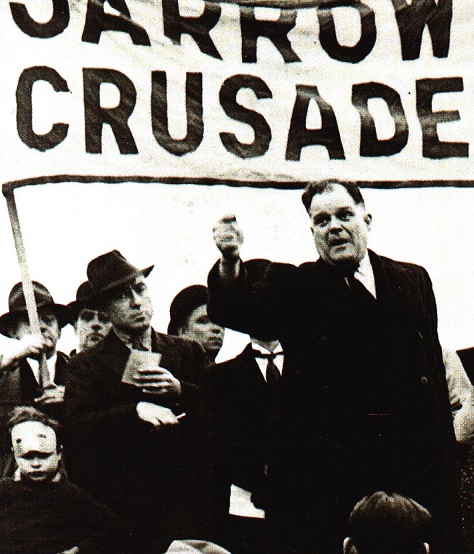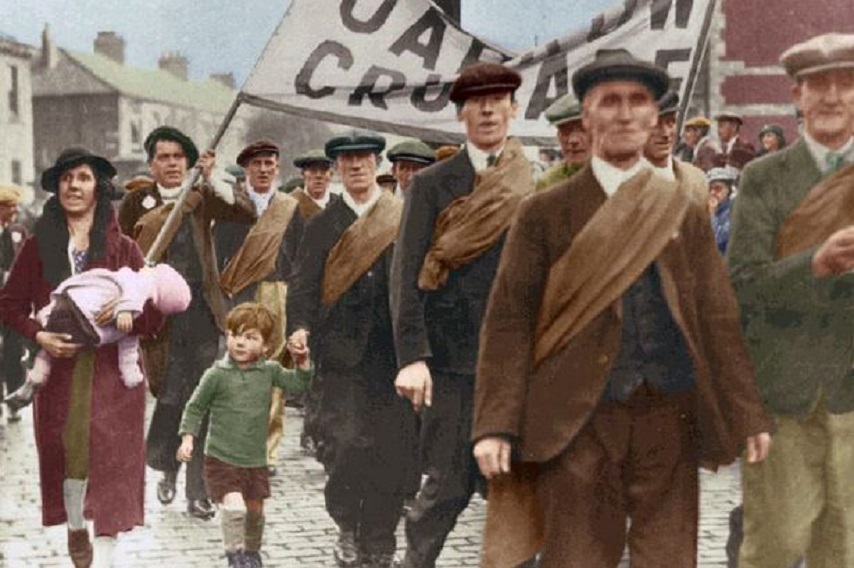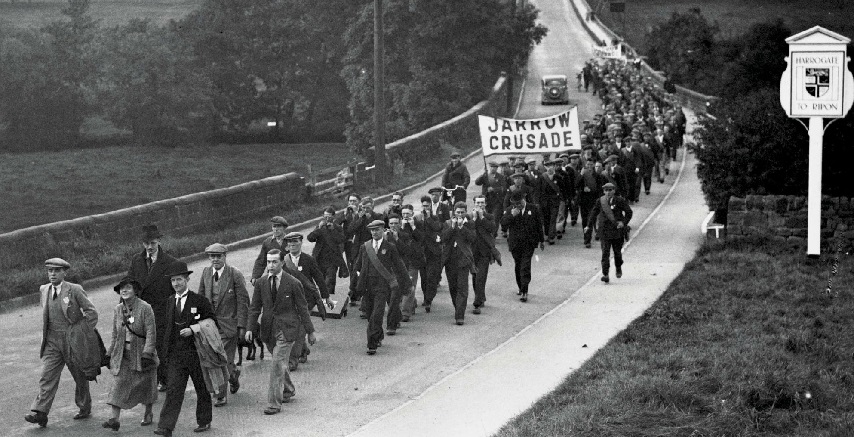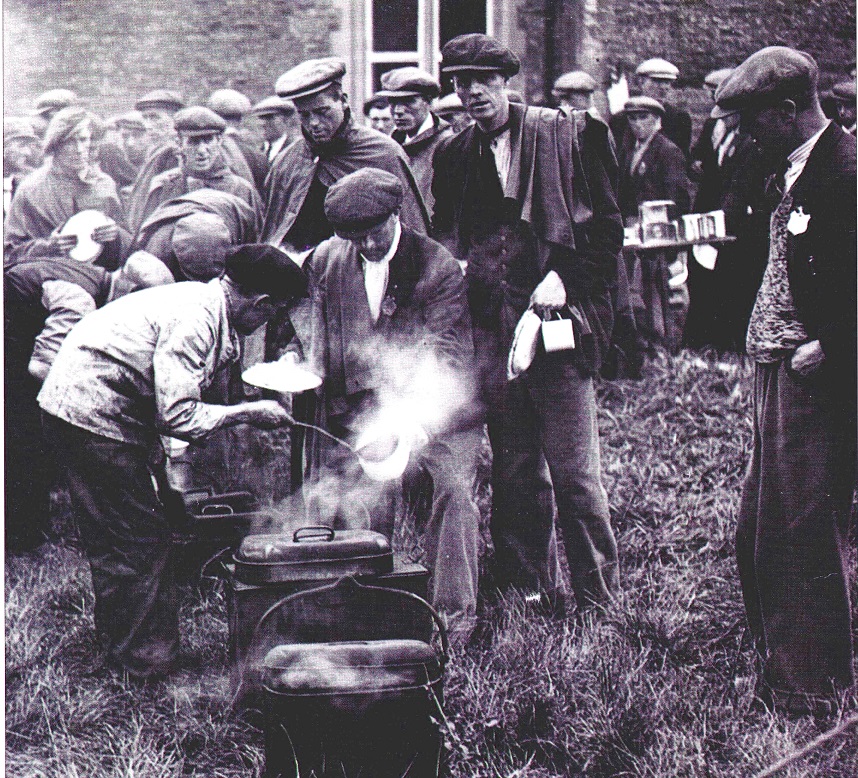
The Jarrow Crusade

Introduction
Jarrow is a town in the north-east of England. Its shipyard, Palmers' of Jarrow, employed 8,000 men. But Palmers' launched its last ship in 1932. In 1934, Palmers' was closed down. Jarrow died. By 1935, 73% of the working population of Jarrow were out of work.
Almost fifty years later, speaking during a radio broadcast in 1979, Ritchie Calder – who was a newspaper reporter in 1936 – still remembered how bad things were:
In Jarrow you saw the face of hunger in the 1930s.
You weren't seeing it on a poster.
You weren't seeing it on the telly.
You were seeing hunger in your own street, in your own mirror.
In 1935 the people of Jarrow elected Ellen Wilkinson to be their first Labour M.P.
`What do [the government] propose to do?' she demanded.
Walter Runciman, President of the Board of Trade, was scornful.
`Jarrow must work out its own salvation,' he said.
The people of Jarrow were furious. They decided to march to London.
After you have studied this webpage, answer the question sheet by clicking on the 'Time to Work' icon at the top of the page
1. Tom Pickard, Jarrow March (1982)
A poem inspired by this photo of David Riley launching the Crusade in 1936:
 David Riley stands on upon a small platform
David Riley stands on upon a small platform
beneath the banner...
His arm is raised and says:
I
will not be broken.
His mouth is open and says:
I
will not be stopped.
His shoulders are straight
and say:
We shall not bend...
A small boy beneath
him,
hands on hip,
a mask lifted from his face,
him, he too, he says so.
Interrogating the sources:
For ALL these sources, looking at all the
details of its
provenance, how true do you think this
account is likely to be?
2. David Riley, speaking in 1936.
David Riley was the Marshall (organiser) of the Crusade.
I think we should get down to London with a couple of bombs in our pockets...
These people do not realise that there are people living in Jarrow today under conditions which a respectable farmer would not keep pigs...
We must do something outrageous which will make the country sit up.
3. Joe Symonds, speaking on the radio in 1979
In 1936 Joe Symonds was one of the unemployed Palmers' workers.
We decided, why not a march to London? We can show them that with all our trouble we still have a bit of spirit left.
4. Paddy Scullion, talking to Tom Pickard in 1982
In 1936, Paddy Scullion was a Councillor in Jarrow.
We thought we'd show our protest to the House of Comons [and] demand the right to work, which was a God given right .
5. Memo to the Metropolitan (London) Police, 1936
Police Special Branch.
The promoters of the march from Jarrow to London have now made definite arrangements for 200 marchers to take to the road on 5th October.
The plans are being carried out by Miss Ellen Wilkinson MP, a former Communist.
6. Ritchie Calder, talking to Tom Pickard in 1982
In one family there were four volunteers from whom only one could go. And the brothers gave the trousers and the jacket and the father gave the boots and the uncle gave the raincoat. And the family marched with one man.
7. Monday 5 October, 1936
Well-wishers, relatives and the town band accompanied the marchers to the town boundary as they set out for London.

8. On the march...
Ellen Wilkinson leading the march. She was a small woman, and took three steps for every stride the men took. Behind her walks Paddy the mascot dog (hidden behind two men, you can just see his legs). Behind the dog, two men carried the petition in a box. Then came a group of men playing harmonicas; the men sang as they marched. The newspapers called the marchers 'a walking distressed area'. Many people cried as they watched the marchers walk past.

9. Meal-time near Bedford
The field kitchen was loaned to the marchers by the Jarrow Scout Troop.
 .
.
10. The route
The final route was planned to go through from Jarrow, Chester-le-Street, Ferry Hill, Darlington, North Allerton, Ripon, Harrogate, Leeds, Wakefield, Barnsley, Sheffield, Chesterfield, Mansfield, Nottingham, Loughborough, Leicester, Market Harborough, Northampton, Bedford, Luton, St Albans, Edgeware and ending at Marble Arch [in London].
11. Sam Rowan, talking to Tom Pickard in 1982
In 1936, Sam Rowan was employed by Jarrow Council. His job was to prepare the way for the marchers.
Our first stop was Chester-le-Street and we stopped in the field and our cooks made tea and dished out corned beef sandwiches... And I can assure you [the men] were looking forward to the meal...
But the next stop we had was at Ferry Hill, and there the miners went to town. We had a dozen chefs in white hats and everything.
12. Guy Waller, talking to Tom Pickard in 1982
In 1936, Guy Waller was a journalist who reported the march.
It wasn't an experience of misery – it was an experience of new scenes each day.
New horizons, fresh air, exercise, challenge. All those things which had gone out of their lives.
13. The North Eastern Daily Gazette, 7 October 1936
Jarrow's Crusaders are healthy in body, putting on weight, happy on the march, but their minds are troubled by rumours that the wives and children they have left behind will not receive their unemployment benefit this week.
14. Sam Rowan, talking to Tom Pickard in 1982
On Saturday 31 October, 1936, the marchers marched into the centre of London.
There were two hundred fighting-fit men, they'd been marching down there, they'd been well-fed all the way down . . . Two hundred fighting-fit men marched into Hyde Park all in their Sunday best.
15. Ellen Wilkinson, writing in the North Eastern Daily Gazette, 1936
It was a great help, the action of the boot repairers of the Leicester Co-operative Society who worked till after midnight without pay mending the boots that so badly needed repair by then. The hospital students provided by the Socialist Medical Association literally kept the men on their feet... Free cinema tickets from cinema managers at every town we stayed in. Kindness all the way. So many passing motorists raised their hats as we passed that we began to feel like [celebrities].
16. Special Branch Report, 6 November 1936
The march ... was well organised and the men well disciplined... During the marchers' stay in London their conduct was perfect, and no incident occurred which required police action.
17. Ritchie Calder, talking to Tom Pickard in 1982
I went back as a marcher to Jarrow. They had this special train to take them home. And we had this do...
Oh, my golly, they did them proud. But it was very touching because the women, you see, they had to borrow. They had no clothes. They had to borrow their neighbours' clothes to come to the party.